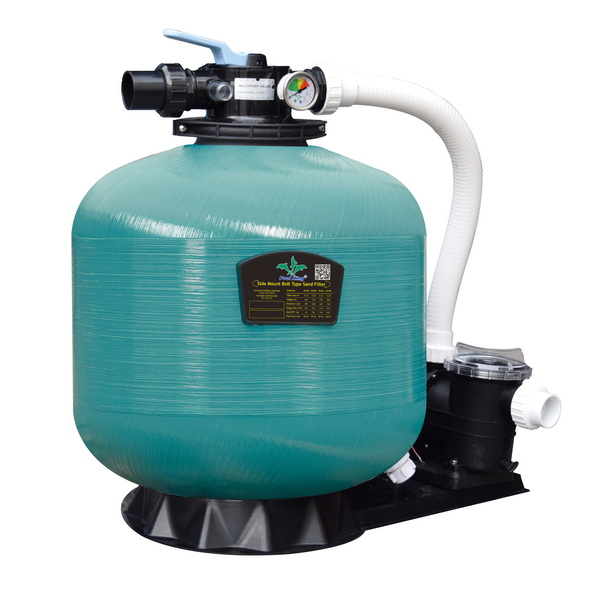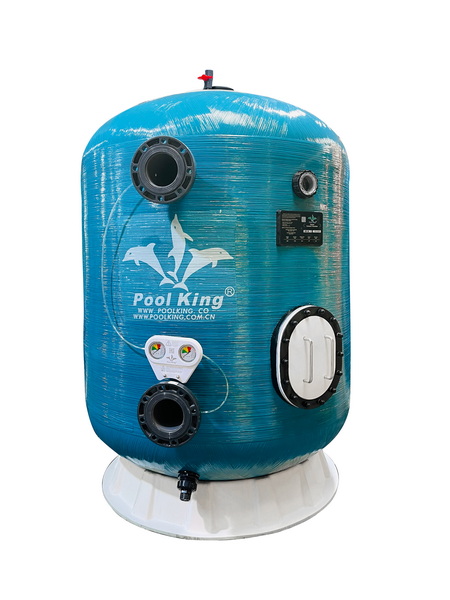Views: 222 Author: Tina Publish Time: 2025-10-20 Origin: Site








Content Menu
● What is a Sand Filter and How Does it Work?
● Typical Lifespan of Sand in Pool Filters
● Factors Influencing Sand Longevity
● How to Maintain Your Sand Filter for Maximum Lifespan
>> Monitoring and Pressure Checking
● Step-by-Step Guide to Cleaning Your Pool's Sand Filter
● Signs It's Time to Replace Your Pool Sand
● How to Replace Sand in Your Pool Filter
● Frequently Asked Questions (FAQs)
>> 1. How often should I backwash my sand filter?
>> 2. Can I replace sand with glass filter media?
>> 3. What causes sand to wear out in my filter?
>> 4. Is a stainless steel sand filter better than plastic?
>> 5. What happens if I don't change the sand?
Keeping your swimming pool crystal clear and safe depends heavily on effective filtration. Among the most popular filtration systems, sand filters stand out for their durability, cost-efficiency, and ease of maintenance. Understanding how long the sand in your pool filter lasts, how to maintain it, and when to replace it can save you money and keep your pool water pristine.

A sand filter uses a bed of specially graded sand to trap dirt, debris, and contaminants from pool water. Pool water is pumped through the sand where particulates get trapped on the rough surfaces of sand grains. Clean water then flows back into the pool. Over time, trapped debris accumulates and the sand's filtering effectiveness decreases, necessitating maintenance or replacement.
- The filter media inside sand filters, typically silica sand or glass beads, usually lasts between 7 to 10 years before needing replacement.
- The filter tank itself, especially when made of durable materials like stainless steel, can last up to 20 years or more if properly maintained.
The lifespan of sand in your pool filter depends on:
- Pool usage frequency: Heavily used pools may require sand replacement closer to 7 years.
- Maintenance routines: Regular backwashing removes debris and prolongs sand life.
- Water conditions: High debris loads or chemical imbalances can degrade sand faster.
- Type of sand: Some advanced filtration medias, like glass beads, can last longer than traditional silica sand.
Regular maintenance plays a crucial role in extending the life of your pool's sand filter and ensuring efficient filtration.
Backwashing reverses water flow through the filter to flush out trapped debris, preventing clog buildup that reduces filter efficiency. It is recommended to backwash at least once every 2-4 weeks or whenever the pressure gauge shows an increase of 8-10 psi over normal operating pressure.
Once a year, ideally during pool closing, a thorough cleaning with a filter cleaner is recommended. The process involves backwashing the filter, then circulating filter cleaners through the sand to remove oils, body fats, and caked-on dirt. Following this, another backwash and rinse cycle flushes out any residues.
Regularly monitor the pressure gauge on your filter tank. A steady increase signals that the sand is clogged and needs cleaning or replacement.
Opt for premium silica sand or specialized glass media to enhance filtration performance and durability.

Cleaning your sand filter thoroughly once a year involves these steps:
1. Backwash the filter for 3-5 minutes to remove large debris.
2. Turn off the pump and clean the pump strainer basket.
3. Add a specialized filter cleaner into the pump strainer basket.
4. Circulate the cleaner by running the pump for 10-15 seconds.
5. Let the filter soak for at least 8 hours to dissolve stubborn contaminants.
6. Backwash again for 5 minutes to rinse away chemical residues.
7. Rinse the filter for 30 seconds and return the valve to filter mode.
Regular cleaning prevents common pool issues like cloudy water, high chemical usage, and equipment damage.
- Cloudy pool water despite regular cleaning.
- Persistent pressure gauge spikes that don't normalize after backwashing.
- Sand grains escaping into the pool.
- Significant decline in filtration performance.
- Aging sand that feels smooth or slick, no longer gritty.
When replacement is due, follow these steps:
- Turn off the pump and release all pressure.
- Remove the multiport valve or tank cover.
- Scoop out and dispose of the old sand according to local regulations.
- Inspect and replace damaged laterals if necessary.
- Add the correct amount of new graded sand as specified by your filter's manufacturer.
- Reassemble the filter.
- Backwash and rinse to settle the new sand.
- Restart the system and check for leaks.
Regular sand replacement every 7 to 10 years keeps your filtration system running efficiently and prolongs the lifespan of your pump and filter.
- Long-lasting media and durable tanks.
- Low maintenance compared to other filter types.
- Capable of filtering large pools efficiently.
- Cost-effective with widely available replacement media.
- Engineered Plastic Sand Filters: Lightweight, corrosion-resistant, suitable for residential pools.
- Fiberglass Sand Filters: Durable and affordable.
- Stainless Steel Sand Filters: Most durable and corrosion-resistant, ideal for commercial or large pools.
The sand in your pool filter generally lasts between 7 to 10 years, influenced by usage, water conditions, and maintenance habits. Consistent backwashing, annual chemical cleanings, and regular monitoring of pressure gauges are essential for maximizing sand life and maintaining clear, safe pool water. When signs of wear appear or sand becomes ineffective, replacing it with quality media ensures your filtration system continues to function optimally. Proper care not only keeps your pool sparkling but also protects your investment in filtration equipment for many years.

Backwash every 2-4 weeks or whenever the pressure gauge rises 8-10 psi above normal operating pressure.
Yes, glass media lasts longer and filters finer particles, but it is typically more expensive.
Sand loses its roughness over time due to clogging with contaminants and physical breakdown from water flow, reducing filtration efficiency.
Stainless steel filters are generally more durable and corrosion-resistant, making them better for long-term use, especially in commercial settings.
Ineffective filtration leads to cloudy water, increased chemical usage, and higher strain on the pump, potentially causing damage.
[1](https://budsspas.com/blog/how-to-clean-your-pools-sand-filter/)
[2](https://www.youtube.com/watch?v=VmXdio44FTY)
[3](https://envirowaste.com.au/mastering-pool-filter-maintenance/)
[4](https://www.swimmingpool.com/maintenance/pump&filter/changing-sand-in-your-pool-filter/)
[5](https://www.factorypoolsperth.com.au/a-complete-guide-to-sand-filters/)
[6](https://splashfiberglasspoolcompany.com/a-guide-to-know-how-often-to-change-sand-in-pool-filter/)
[7](https://lesliespool.com/blog/the-ultimate-pool-filter-maintenance-guide.html)
[8](https://www.poolsuppliescanada.ca/how-to-clean-a-sand-filter.html)
[9](https://alliedpools.com/maintaining-your-sand-filter-system)
[10](https://www.poolwerx.com.au/blog/diy-advice/how-to-maintain-a-pool-filter/)
This guide explains how to safely increase pressure on a pool pump by restoring healthy water flow. Learn to diagnose low pressure, clean baskets and filters, fix air leaks, adjust valves and pump speed, and know when equipment upgrades or gauge replacement are necessary.<br />
This in‑depth guide explains how much it costs to replace a pool pump, covering typical price ranges, pump types, labor charges, and long‑term energy savings. Learn when to repair vs replace, DIY vs professional options, and how OEM pump and filter solutions can reduce lifetime ownership cost.<br />
Learn exactly how long to run a pool pump daily for crystal‑clear, safe water and lower energy bills. This in‑depth guide explains turnover, seasonal adjustments, single‑ vs variable‑speed schedules, energy‑saving tips, and practical examples, plus answers to common runtime questions.
This in‑depth guide explains the real reasons your swimming pool pump is not working, from power and priming issues to clogged impellers, dirty filters, and motor failures. Learn step‑by‑step troubleshooting, key maintenance tips, and when to repair or replace your pool pump.
Learn how to remove a pool pump motor safely and efficiently with this step‑by‑step guide. Discover the tools you need, how to disconnect power and plumbing, when to call a pro, and how OEM filter and pump solutions can support overseas pool brands and wholesalers.<br />
This article introduces leading Pool Filter Valve Manufacturers and Suppliers in Japan and Asia, covering valve types, key Japanese pool brands, OEM opportunities, and application segments. It explains how advanced engineering, strict quality control, and strong visual marketing help exporters win global pool projects.
This article introduces the main types of Pool Filter Valve Manufacturers and Suppliers serving Russia, including local distributors, industrial filter producers, global brands, and Chinese OEM partners. It explains key selection criteria, product ranges, and OEM opportunities for Russian pool projects.<br />
This article introduces the leading Pool Filter Valve Manufacturers and Suppliers in Australia, explains common valve types and technical features, highlights major distributors and OEM opportunities, and offers practical tips for international buyers sourcing compatible filtration valves and systems.
This article introduces Italy’s leading Pool Filter Valve Manufacturers and Suppliers, detailing their technologies, materials, OEM services, and application scenarios. It explains how Italian valves integrate with sand, DE, and cartridge filters and why global brands choose Italian partners for premium pool filtration solutions.<br />
This article introduces the Portuguese market for pool filtration equipment and highlights how local specialists, European brands, and Chinese OEM Pool Filter Valve Manufacturers and Suppliers cooperate to serve residential and commercial pools, offering multiport valves, filters, pumps, and customized OEM solutions.<br />
This article explains whether you can safely use pool filter sand in an aquarium, covering sand types, preparation, pros and cons, plant and fish compatibility, maintenance tips, and alternatives. It helps hobbyists choose and manage substrate using pool-grade filtration media.
This article explains when to backwash a pool filter using pressure readings, water clarity and flow as guides. It covers sand and DE filter schedules, backwash steps, common mistakes, troubleshooting cloudy water, and how OEM sand filter systems can simplify maintenance for global pool owners.<br />
This article explains what pool filter balls are, how they work, and why they are an increasingly popular alternative to sand in residential pool filters. It covers benefits, installation, maintenance, compatibility, and OEM opportunities for brands seeking high‑performance filtration solutions.<br />
This article explains how often to change a pool filter cartridge, covering typical 1–3 year lifespans, signs of wear, and factors like usage, climate, and maintenance. It shows how cleaning frequency, pressure readings, and water clarity guide replacement and highlights the value of OEM cartridge solutions.
This article explains how often to change a pool filter cartridge, covering typical 1–3 year lifespans, factors that affect replacement timing, and clear signs of wear. It outlines cleaning versus replacement, residential vs commercial schedules, and highlights OEM cartridge solutions for complete pool filtration systems.<br />
Learn how to remove a stuck inground pool ladder step‑by‑step, from releasing anchor wedges and dissolving mineral buildup to using safe, controlled force and seasonal maintenance. Discover tools, safety tips, and prevention methods to protect your rails, anchors, and pool deck.<br />
This guide explains how to remove a corroded pool ladder step by step, from safety prep and penetrating oil to leverage, heat and cutting as a last resort. Learn how to clean and restore stainless steel, prevent future corrosion and decide when to replace the ladder for long‑term pool safety.<br />
Reinforce a pool ladder the right way with solid base leveling, secure deck anchors, safe weighting, better traction, and corrosion control. Learn practical DIY methods, maintenance tips, and safety standards to make above‑ground and in‑ground pool ladders sturdier and safer for every swimmer.<br /> <br />
This guide explains how to put up a pool ladder safely, covering ladder types, tools, and step‑by‑step installation for above‑ground and in‑ground pools. It also details stability tips, safety checks, maintenance advice, and multimedia ideas to help users install ladders with confidence.<br /> <br />
This in-depth guide shows how to put together a Vinyl Works pool ladder step by step, from sorting parts to final safety checks. It covers tools, ballast, handrails, mounting to pool or deck, gate installation, maintenance tips, and a clear FAQ to help owners assemble with confidence.<br />
